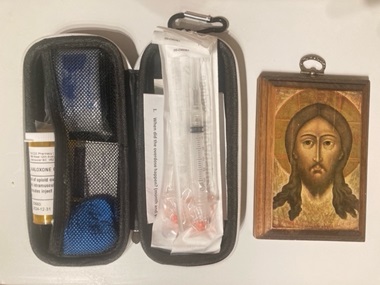 The church in Vancouver needs a theology of harm reduction. Our city has been at the epicentre of the overdose crisis. It has also been at the forefront of harm reduction drug policy for the past three decades.
The church in Vancouver needs a theology of harm reduction. Our city has been at the epicentre of the overdose crisis. It has also been at the forefront of harm reduction drug policy for the past three decades.
Yet, there has been a surprising lack of theological reflection on its relation to Christian faith. That’s doubly surprising given the Christian community’s deep involvement with those struggling with substance use.
Harm reduction encompasses a range of interventions and strategies aimed at reducing the harms and risks associated with drug use. Attitudes in our churches towards it tend to fall within the vague apprehension to serious reservations range, though it’s true there are also Christians on the frontlines of harm reduction service provision. It is my hope that we can begin to talk more openly about this issue in the light of the gospel – to inform our practices of pastoral care and chaplaincy, our work of mission, and yes, also, our civic engagement.
When I moved to the Downtown Eastside of Vancouver in 2001, it was out of a deep longing to follow the way of Jesus. I wanted to see my new neighbours who had been beaten down by life lifted up. I wanted to see those who had lost hope, recover their identity as beloved children of God. I wanted to see the wounded healed, the captives freed, and good news announced to the poor.
But the truth is, I understood very little of the realities I was entering into: of addiction, mental illness, poverty, homelessness, trauma, the legacy of residential schools, or of the experience of being an outcast from mainstream society.
The intervening 23 years, during which I have served as a pastor and in various ministry roles in the community, have been a long process of learning and theological reorientation. One of the things I found myself rethinking is my attitude towards harm reduction as an approach to drug use and addiction.
‘Harm reduction’ is not one thing. It includes providing sterile needles and other drug consumption supplies to prevent the spread of HIV, HEP-C and other communicable diseases. It includes supervised injection (or ‘consumption’) sites to prevent overdoses or reactions to toxic drugs leading to death.
It can include prescribed opiate replacements like methadone when used to stabilize the lives of those with opiate dependency. And more recently it also includes ‘safe supply’ programs that prescribe opiates to drug users so that they aren’t forced to buy street drugs with unknown constituents – such as fentanyl – and potency, which places them at high risk of drug poisoning and overdose death.
When Insight, Canada’s first legal supervised injection site opened in Vancouver in 2003, I had serious reservations. In fact, I wrote an article about it in a Christian publication at the time recommending readers oppose the program. It’s not that I lacked compassion for those struggling with drug use and addiction. But it seemed to me that supervised injection sites crossed the line from being compassionate and non-judgmental to validating and participating in the self-destruction of addiction.
If I had to point to one story from the life of Jesus that captured my perspective at the time it would have been the exchange with the woman caught in adultery recorded in the eighth chapter of the Gospel of John. After Jesus challenges the woman’s accusers by saying, “Let him who is without sin throw the first stone,” (and after they subsequently slinked away), he curiously says to her, “Neither do I condemn you, go and sin no more.” Compassionate non-judgment – and also a clear instruction to leave her old ways behind.
I now think that this is the wrong gospel story and the wrong theological category to be thinking about drug addiction. It implies that at the root of addiction is either sinful choice or corrupted character. While I may have hesitated to acknowledge it, this way of thinking was shaping my response to harm reduction policy at the time.
I’m still not fully sure how to understand addiction. I’m also uncomfortable with a purely medical view which understands addiction on the model of physical disease, though that is probably closer to the truth. Still, it fails to locate the wounds in the right place, in the human spirit. And it also fails to capture the complex role human agency still plays in the experience of those in addiction.
I’m most drawn to seeing addiction, at least in the more extreme forms to which harm reduction programs are directed, as at its roots a kind of desperate coping response to unprocessed traumatic experiences, often from early childhood. A coping response that calcifies into a self-reenforcing habit. But how do we put this in the theological language of Christian anthropology? What gospel stories can help us get our bearings?
Among that the things that Jesus declares as part of his announcement of the kingdom of God in the gospels is that the wounded will be healed and the captives will be set free. To my mind, addiction is a kind of wounded bondage, an imprisonment in wounding. And as was so often the case with the individuals Jesus encountered, these wounds and bonds are closely interconnected with breakdowns in and estrangements from relationships and human community.
Recovery from addiction is often a long process of healing and unfettering, and if harm reduction measures can keep the window open longer for that process to take place, then I’m all for it. I also think no one, especially those already so wounded, should be left to suffer needless risks and harms.
Harm reduction is again in the public spotlight, with the federal Conservatives making opposition to ‘safe supply’ a key plank in their drug policy platform. Even the provincial NDP government, generally supportive of harm reduction, came under criticism recently from BC’s outgoing chief coroner Lisa Lapointe for refusing to expand safe supply measures.
I don’t mean to suggest there are simple answers to drug policies for our city. Empirical evidence on safe supply is in the early stages. There are also difficult questions of balancing priorities. Over 20 years ago, then Vancouver Mayor Philip Owen, a Christian and life-long parishioner at St. John’s Shaughnessy, proposed a ‘four-pillar’ approach to Vancouver’s drug addiction problem – prevention, treatment, harm reduction and enforcement.
This framework opens up space for public discussion about how best to balance harm reduction measures with other necessary aspects of drug policy. I worry that investing in harm reduction measures without also investing in treatment and recovery could end up being a strategy of problem management rather than of healing and liberation.
But questions of public policy are not my only concern. My concerns are also those of a pastor and member of a local church. How are we to minister to those in our churches and neighbourhoods who are struggling in addiction but are not yet ready for treatment? Shouldn’t we be pealing back the stigma and shame surrounding addiction, and support options that can preserve life and keep open the window for recovery?

Jamie Hellewell
And what about the front line harm reduction workers in our pews, many of whom pay a heavy cost for extending care to the most vulnerable and face high risk for secondary trauma and burn-out? How can we come alongside them in our pastoral care? Can we help them to see their own work in the framework of the gospel?
And how are we to teach and preach into the realities of our city, in which 725 of our neighbours died last year from drug poisoning and overdose, without also speaking good news into the pain and experience of drug use and addiction?
Jamie Hellewell lives in the Downtown Eastside with his wife April and their three daughters, Anna, Dorothy and Junia. Prior to becoming a pastor with the Strathcona Vineyard, he studied and taught Philosophy at UBC.

Thank you for Jamie Hellewell’s op-ed; a very readable, informative and compassionate reflection. A welcome contribution.
I wonder if, in the shared pursuit of understanding addictions, he has yet read and even talked to Aaron White, also a Downtown Eastside pastor, and his recent, compelling Recovering: From Brokenness and Addiction to Blessedness and Community?
There are also Gerald May and Bruce Alexander’s virtual classic contributions and so well researched – respectively May’s Addiction & Grace and Alexander’s The Globalisation of Addiction and its due subtitle: ‘A Study in Poverty of Spirit’
Addiction is a mammoth, multi-dimensional, inter-disciplinary and inter-generational topic and even for those of us struggling in and with addictions, there feels no one formulae, analysis and/or prescription. Mind us, sometimes we may come close. To engage it theologically, remains, indeed a friendly but not short, challenge.
Twelve-step groups and related recovery from addiction circles of trust are surely worthy companions, as are, implicitly, biblical faith, with its abiding, experiential stories of honest struggle to make sense out of who we really are, including the depths of our secrets, the failures of our systems, the perennial inclinations to self-righteousness and the awesome summons to be bold, humbly.
In peace and strength . . . Barry K Morris